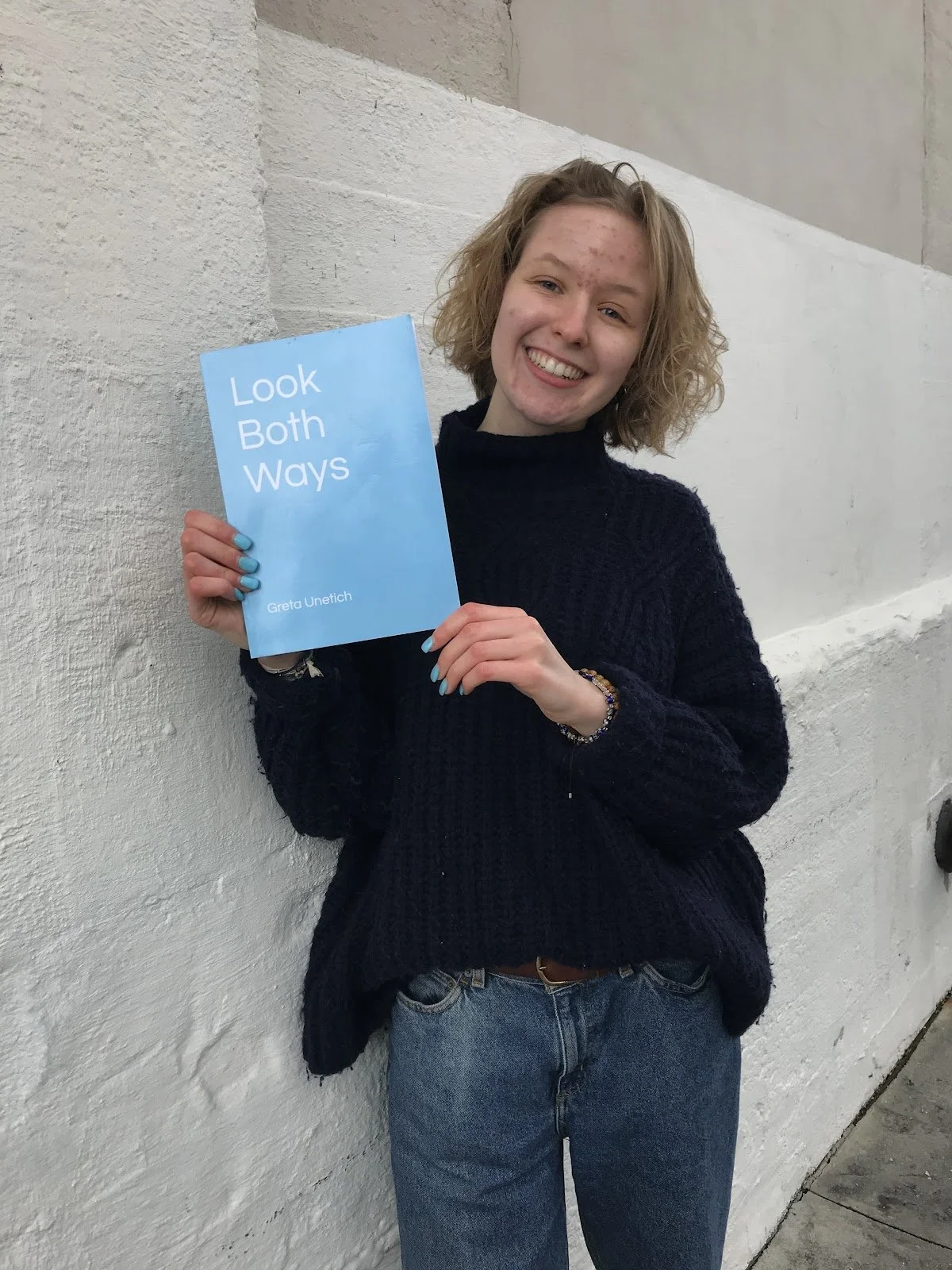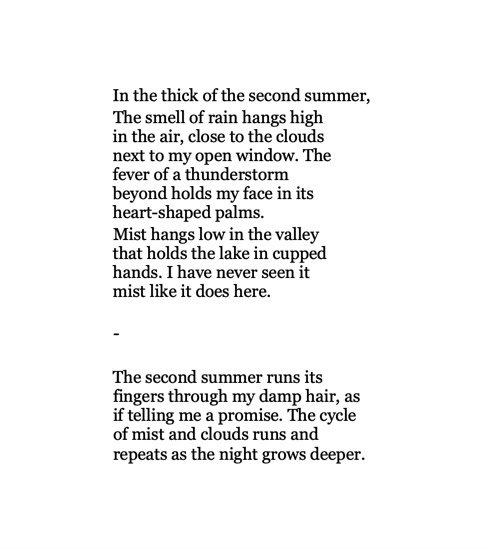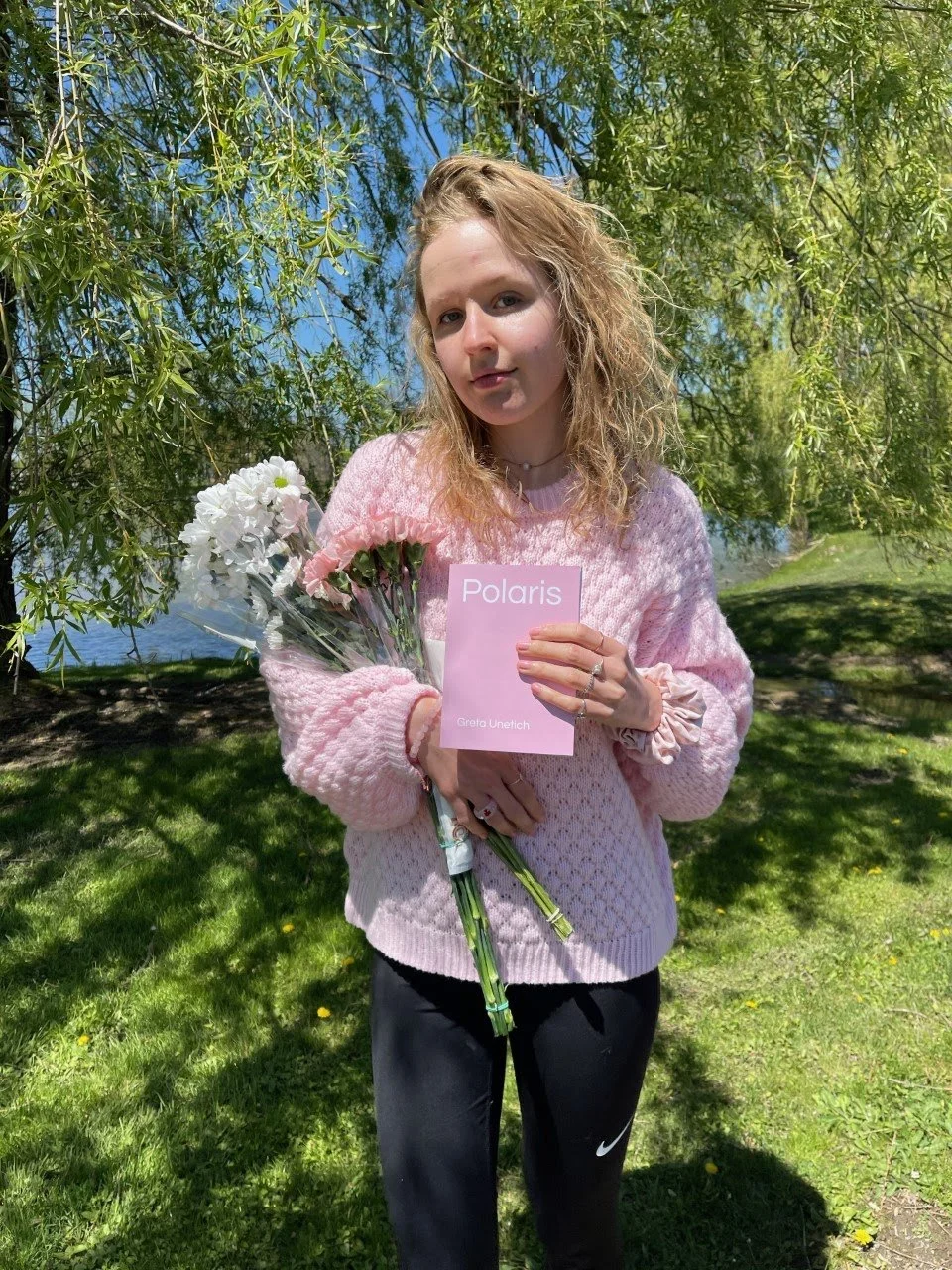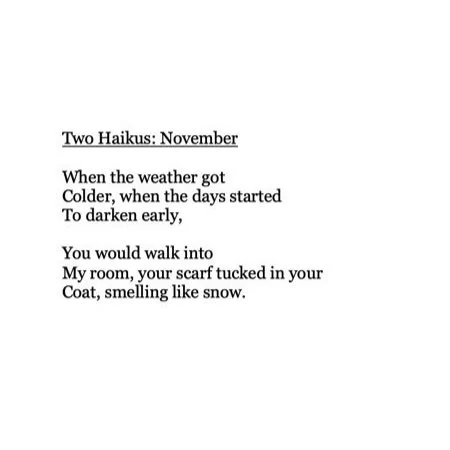December 7, 2021
Greta Unetich: Writing to remember
STORY BY Lorelei Horrell / EDITED BY Olivia McKeon
Greta Unetich (’23) is a writer with two self-published poetry books, Look Both Ways and Polaris. She’s a biology major with a minor in chemistry, and she’s planning on staying an extra year at IC to complete her master’s in education. On campus, she is a co-editor of the Prose and Cons section of Buzzsaw Magazine. She’s also a regular contributor for Living Zine and Kindergarten Mag. Along with her own poetry collections, her work has been published in numerous literary magazines in the U.S., Canada, and India. After graduation, she wants to be a high school chemistry and biology teacher and a hospital diabetes educator, and to continue writing in between it all.
Lorelei Horrell sat down with Greta Unetich to discuss the evolution of her identity as a writer while studying science and the importance of overcoming self-doubt.
LH: It’s so interesting that you’re a STEM major, but you do so much writing work. Do you feel like people are often surprised when you tell them your major?
GU: Oh, definitely. It was kind of a weird transition. My parents were both STEM majors in college. My mom was a mathematics major with a concentration in statistics, and my dad was a chemistry major. Now, they’re both engineers. So, I kind of got grandfathered into STEM. Especially my mom was like, “It’s so important and so valuable to be a woman in STEM,” which is a phrase I have beef with, but that’s another conversation for another time.
Basically, all throughout middle school and high school, when you would start getting into upper-level courses, my main priority was biology, chemistry, science, and math. I feel like sometimes that hindered me from having a hobby because it was a lot of work. All throughout middle school and a good portion of high school, I was just dedicating my time to science.
In eighth grade, I started writing a little bit of poetry. It wasn’t as intense as it is now. It was more like, a poem here, a poem there—they weren’t very great, just like all things you start out doing aren’t great. Then I was writing from eighth grade to halfway through my sophomore year of high school. Then I stopped writing for whatever reason—no inspiration. I didn’t write for a very long time.
But when I got accepted into college, I started picking up writing again because—this is really contradictory—but I felt like I had more time in college. Obviously, I’m still focusing on biology and chemistry, but I do find that I have an hour or two or three a day and weekends to focus on writing, which is so nice because it’s something that I value so much. And I didn’t know that I value it so much until I got into college.
But—going back to middle and high school—people would know me and say, “Greta is in biology, chemistry. She puts a lot of time into STEM. That’s her thing.” I thought I was good at it, but it didn’t feel like me. Then, in college, when I published my first book in January 2020, right before the pandemic hit…people were shocked. But this is just who I am. I feel more like myself when I’m writing. Obviously, I’m still going to stick with biology and chemistry because I’ve dedicated so much of my life to it, but it’s a nice thing to do on the side or at the end of the day.
When I started college, I wasn’t in Buzzsaw or anything. There’s a club called Spit That! that I’m in now. I wasn’t in any of that. Now that I have involvement in these two poetry clubs, I just feel a lot more connected to it. Now, when I introduce myself to people, the first thing I bring up is that I’m an author, or I’m a poet. My major is secondary. I don’t think that should be the first thing people associate me with because that’s not really who I am as a person. I feel a lot more comfortable with my identity as a writer, author, and poet. It’s totally valid to be able to do both, and there’s room for both things.
LH: You already shared a little about your future plans. Do you think you’ll also continue writing and publishing work?
GU: Definitely. I always joke around—half serious, half joke—that I don’t know how I kept myself alive in middle school and high school. That was just when I was getting into [writing], so I didn’t do it a lot. I feel like if I had stayed in that state of my life where I was keeping it super hidden, I would’ve died or something. Poetry is keeping me alive. That’s such a cheesy thing to say, but it’s true.
So, I definitely want to keep putting out works. I’m actually working on two things right now. One is a thing for a friend related to poetry. And I’m working on another piece now. I definitely want to keep doing that. My books are self-published—they were never taken up by a big name publisher or a “real” publisher. I’ve submitted to big publishers and gotten rejected. I think that’s fine with me.
In the future, I want to keep putting out works because that’s my hobby. Everyone needs a hobby or things that aren’t work to them 24/7. I do put a lot of time and work into poetry, but to me it’s not really work because I enjoy it so much. I don’t know how I’d be alive if I stopped writing poetry or lost involvement in the magazines I write for or the clubs I’m in.
LH: In terms of your writing, what kinds of subjects or topics often inspire you? Or, what themes do you find yourself coming back to?
GU: My first book, Look Both Ways, I feel like it was a little bit forced, and it didn’t have the potential that I wanted it to have. I was writing all of these poems in the moment. But with Polaris, it’s all based on memories. The subjects of Polaris and Look Both Ways are—I don’t want to say the same, but they are very similar. I wrote about some of the same events in them. But with Polaris, I wrote about that stuff a year and a half later. Whereas, with Look Both Ways, I would write about something the day it happened.
For me, it’s better to write about memories, which is what the two things I’m working on right now are mainly based on. I cannot write about a current thing to save my life. I find it’s a lot better to experience something and let it sit until it becomes a memory, or you know it’s not going to happen again, as sad as that sounds—but that’s what makes it good.
LH: What sort of writing or writers do you like to read when you have free time—if you ever have free time?
GU: This is a terrible thing to say, and I need to break this habit because I know it’s good to read a diversity of authors and a diversity of genres—but the only thing that I can focus on right now is poetry because it’s short. Well, not all poems are short. But, it doesn’t follow a plot, and you can stop whenever you want, and you can pick up whenever you want. It’s not segregated by chapter.
Some of my favorite poets are Mary Oliver—love her. I like W. S. Merwin. I like Richard Wright’s haikus. There’s a more modern author that I like—her name is Lydia Redwine. She has two books of poetry that are absolutely phenomenal.
LH: What does your writing and revision process like? Do you like writing on paper, or do you usually type on a computer? What do you find works for you?
GU: Sometimes if I’m in a situation where I can’t whip out my notebook and start writing a poem if it pops into my head, I’ll type out a rough draft—like a few bullet points—on my laptop. I’ll take those bullet points and try to format them into little sections or poems. And that still won’t be finished. I’ll rewrite it again. I’ll add to it for a few days, weeks, months, whatever.
My high school English teacher used to say, “You really don’t stop writing.” Once you start writing, there’s always more to add. You’re going to be adding to it for the rest of your life. So there has to be a point where you say, “Okay, I’m done.” That point for me is when I want to publish—when the book is long enough, or I feel like everything I want in the book is done. I’ll just keep adding sporadically when something pops into my head until I finally decide, okay, I feel like this book is complete, I’m gonna put it out there.
Even with Look Both Ways and Polaris, something will pop in my head even today. You’re never really done writing but, definitely, as the poem gets longer, I start thinking of that poem less and less. It’ll only be like, every once in a while. In the beginning, it’s more busy because I’m going between my phone, my laptop, my notebook and making arrows everywhere, going to different pages where I need to add something or delete something. It’s just so chaotic.
LH: Do you mostly work by yourself? Or do you have other people read what you’re working on?
GU: This might be the only child in me, but I love working on my own. Even with my books, the only time I really had someone collaborate with me was when the draft was done. But that was more just for typos or grammatical things or capitalization—small stuff like that. But I definitely prefer working by myself. Because, like I said, I mostly write about memories. No one else has experienced that. I asked one of my friends from high school to read over Polaris and Look Both Ways. And, obviously, she wasn’t the person to experience those memories with me. I never really asked about content.
LH: I was actually going to ask you about the publishing process, hearing that you did most of it by yourself. That seems like a lot of work to take on. What was that like? How long did it take you?
GU: I published through Amazon’s publishing company called Kindle Direct Publishing [KDP]. Basically anyone can publish anything they want. And that was actually a very easy website to use. I am terrible with computers, but I was able to figure it out on my own.
When I was publishing Look Both Ways, I was really nervous because it was my first book. No one knew that I was a writer. And I was like, “What if I get like, heat for this? What if people are gonna be like, aren’t you a STEM major? Why are you publishing a book?” It was definitely super, super scary, putting it out there.
As far as the actual publishing process went, on KDP there’s three sections when you want to publish. The first section asks for the author name and name of the book. They assign you an ISBN. Then the second part is uploading the manuscript, uploading a cover, putting the title on the book, and a subtitle, if you want one. That part to me was the hardest because of sizing and margins.
It was less hard for Polaris because I already had a little bit of experience. But oh my god, with Look Both Ways, I remember, the book was done. I was ready to put it out there. I thought, “I’m gonna upload it, and life’s gonna be fine.” Okay, no. I went to a coffee shop. And I was there from 10 a.m. to 4 p.m. just formatting this book because, like I said, I’m not very good with computers. I needed to make sure the sizings were consistent. When I finally got the PDF done, when it came in, the book was massive—physically, just very big dimensions. Of course, when I was picking sizes, I had no concept of this.
That section of publishing was definitely the hardest just because of logistics. Once it gets approved, it’s available for people to order on Amazon, just like you would order anything else on Amazon.
LH: It must be so exciting to see that people can physically hold your work. Earlier, you mentioned being scared when you first decided to publish. What inspired you to actually take the step to making a poetry collection?
GU: I think it was just something I had been dreaming of for so long that to me the idea wasn’t new because, when I was in elementary school I thought it would be so cool to publish a book. Of course, seven-year-old me didn’t know what I was gonna write about—if it was gonna be a novel, a book of poetry, or something else. But then, when I started getting more into poetry, I realized, “I can actually publish this and my friends will read it. Other poets will read it. It’ll be available for people to buy. That’s kind of cool.”
By the time I felt like that, Look Both Ways was done. The idea had just sat with me for so long that it wasn’t a new idea to me. I knew it was gonna be a shock to a lot of people. That was kind of intimidating. I had no idea how people were gonna react. But I knew it was definitely something I wanted to do.
When it finally did come out, and everyone had access to it, it was so weird. You can order author copies of the book, and they’re very cheap. I ended up ordering two books. The day that they came in, I was actually out with a friend. When I came home, I got a package in the mail. I didn’t know what it was. So then I took it upstairs. And I opened it, and I was like, “Oh my god, my book.” I just remember sitting on the ground, and the two books were in front of me. And I kind of didn’t know what to do with my life. I was like, “This is everything I’ve ever wanted or ever dreamed of. I can basically die happy right now.”
That was absolutely crazy because I picked it up—this massive book because I didn’t know how to do the sizing—I just picked it up and I thought, “This isn’t real. This has to be some kind of fever dream. I gotta wake up or something. I did this from scratch. I didn’t tell anyone. No one helped me with it except my friend who helped me proof it. But like, no one helped me figure out the publishing process. I did this by myself.” That was kind of the first time in my life where I felt like I did something completely by myself—no extra help—and succeeded in it.
LH: You’re an editor for Buzzsaw, and you’ve also submitted to literary magazines. What’s it like seeing both sides of that process? Have you learned anything that surprised you?
GU: I was in the second semester of my freshman year, and I was a writer for [Buzzsaw Magazine’s] Pros and Cons. Basically, I would just submit a poem. But then when I became an editor for Buzzsaw, the work obviously increased. I still submit a poem, but I also read, like, 15 other people’s poems. I’m a co-editor with Guadi [Fanelli]. We both get a submission, we both proofread it and then send it back. And then they send it back with edits. It’s more of an organizational challenge than anything. It’s definitely nice to have a co-editor because I don’t know how I would do it without Guadi.
When I send in a poem to a magazine that I’m not an editor for, it definitely makes me appreciate an acceptance more—or even a declining—because I know what it’s like to be on that other side. It’s exhausting. It’s a lot of work. I mean, I definitely enjoy it. I wouldn’t give it up for anything, but it is a lot of work.
LH: Is there anything you think is important that we didn’t get to cover yet in this interview?
GU: Yes! When I was in middle school and high school, the thing holding me back from publishing a first book earlier was definitely fear. I was worried what people would think of me, or if they would support me. People think, like, “What if, what if?” There’s basically 1,000,001 reasons something can wait another year, or just a little bit longer. This is going to sound super cheesy—the fear is valid, doing something new like that is huge, and you’re definitely in the right to be scared—but I wouldn’t let it prevent you from doing what you want to do.
If I was back then, looking at where I am now—I have two published books, I write for magazines, I’m an editor for a magazine. I just feel like younger me would have been like, “She got past her fear. She’s involved in all these things. She has two books now. And she’s still writing.” Chances are no one’s actually going to say, “Why did you do this? That’s so weird. That’s so bad. That’s not you.” So, don’t let that fear hold you back from doing what you want to do.
A selection of Greta’s poetry





